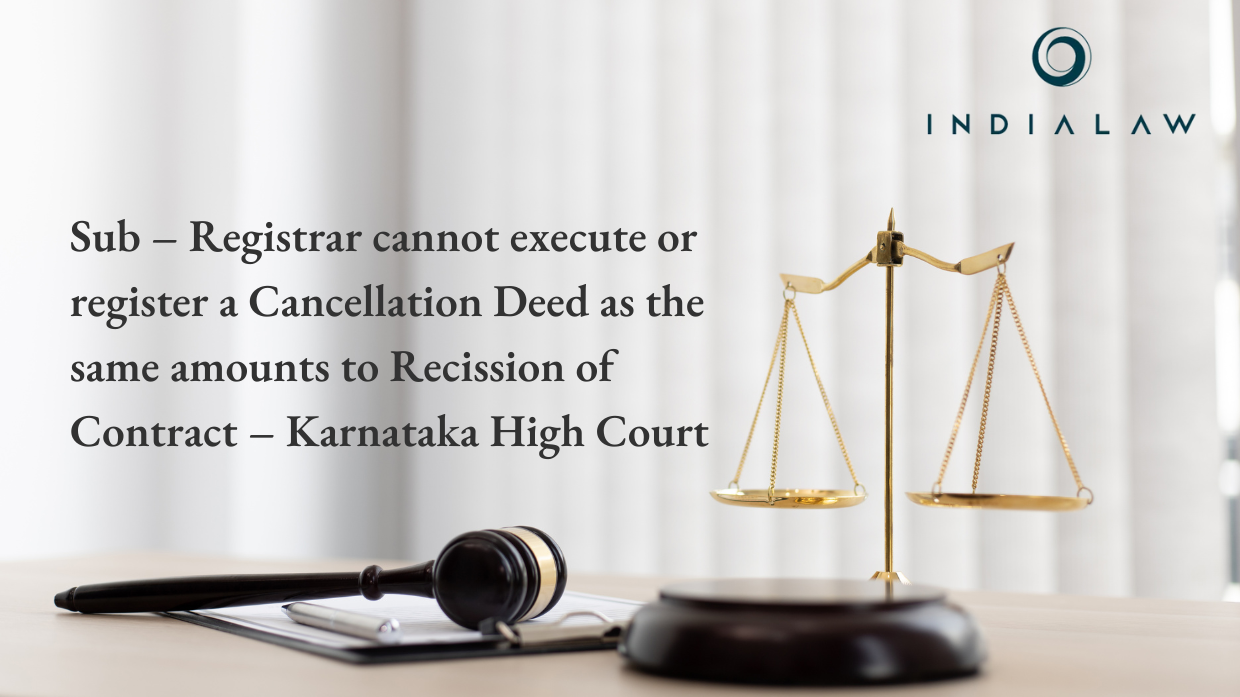Sub – Registrar cannot execute or register a Cancellation Deed as the same amounts to Recission of Contract – Karnataka High Court

In an important recent decision[i], the Hon’ble Karnataka High Court (“HC”) has laid down the law in relation to execution of cancellation deeds, holding that a Sub – Registrar cannot execute any deed by which a party requests cancellation of a previously registered document. In holding so, the HC has clarified the appropriate remedy which a party ought to utilize if it requires to cancel a registered document; the same is discussed in detail hereinafter.
This dispute related to a General Power of Attorney (“GPA”) executed by one Smt. Madhumati (“the Petitioner”) in favour of her husband, Shri. Mahadevappa (“the Petitioner’s husband”). The GPA was executed by the Petitioner for the purposes of income tax assessment pertaining to her business concern as well as subsequent payment of income tax dues. However, in the course of acting on the GPA, the Petitioner’s husband apparently breached the terms of the GPA by issuing not only a public notice in a newspaper but also a legal notice.
Therefore, the Petitioner presented a document aptly titled ‘Cancellation of General Power of Attorney’ dated 10th February, 2023 to the Sub – Registrar, Ramdurg, (“Sub – Registrar”) for its registration (“Cancellation Deed”). The Petitioner executed the said Cancellation Deed with the intention of revoking and rescinding the earlier GPA. However, the aforementioned Sub – Registrar vide an endorsement also dated 10th February, 2023 declined to register this Cancellation Deed on the ground that the disputed GPA is coupled with interest and therefore, he has no power to register such Cancellation Deed. Vide the same endorsement, the Petitioner was directed to exercise the remedies available to her before the appropriate civil court.
The HC found itself bound by an earlier decision of a Division Bench of the same High Court in the case of Veerabhadrappa and Anr. v. Jagadishgouda and Ors.[ii] whereby it was held that a Sub – Registrar can neither keep the document pending nor impound it on the ground that valuation shown was incorrect. The Division Bench also held that a Sub – Registrar holding the document on the ground that they were undervalued and demanding deficit stamp duty as a condition precedent for registration was also held to be illegal and without jurisdiction.
Finding itself faced with a question as to cancellation of registered documents, the HC applied the following reasoning:
- The cancellation of a deed can be equated to rescission of contract. In contractual matters, the term rescission is used to denote cancellation. Therefore, when a party having executed the document seeks cancellation of the said document, it needs to be viewed in the light of section 62 of the Indian Contract Act, 1872[iii] and therefore, cancellation must be done bilaterally and not unilaterally.
- The only remedy available, in such a scenario, is to invoke section 31 of the Specific Relief Act, 1963[iv].
- The Registering Authority does not possess quasi – judicial power. The role of a Sub – Registrar stands discharged once the document is registered under section 17 of the Registration Act, 1908. There is no express provision in the Registration Act, 1908 which empowers the Registrar to recall such registration.
- The power to cancel registration is a matter of substantive law. In absence of any express provision permitting such power to the Sub – Registrar, it is not open for such officer to assume its competency in cancelling of a registered document.
Ultimately, the Sub – Registrar’s endorsement dated 10th February, 2023 rejecting the registration of the Cancellation Deed was upheld as well as the directions made therein to the Petitioner to ventilate her grievances before the appropriate civil court.
In the authors’ opinion, this decision has a great impact on the practice observed around the country wherein persons unilaterally present cancellation deeds similar to the one in the instant case, for registration. The HC has made it unambiguously clear now that in cases where the registered document is bilateral in nature, then the cancellation of such documents must be made by both parties jointly. If the same is not possible, perhaps due to the malafides of one of the parties, then the party seeking cancellation cannot seek registration of a cancellation deed unilaterally. Such party should seek recourse to the civil court, which term would also include a host of judicial / statutory authorities, seeking cancellation under the contours of the Indian Contract Act, 1872 and the Specific Relief Act, 1963.
[i] Smt. Madhumati v. The State of Karnataka and Ors. [W. P. No. 103965 / 2023 – Hon’ble High Court of Karnataka, Dharwad Bench] (decided on 9th October, 2023). The coram consisted of Sachin Shankar Magadum, J.
[ii] ILR 2003 Kar 3042.
[iii] Section 62 of the Indian Contract Act, 1872 states as follows:
“62. Effect of novation, rescission, and alteration of contract.—If the parties to a contract agree to substitute a new contract for it, or to rescind or alter it, the original contract, need not be performed.”
[iv] Section 31 of the Specific Relief Act, 1963 states as follows:
“31. When cancellation may be ordered.—(1) Any person against whom a written instrument is void or voidable, and who has reasonable apprehension that such instrument, if left outstanding may cause him serious injury, may sue to have it adjudged void or voidable; and the court may, in its discretion, so adjudge it and order it to be delivered up and cancelled.
(2) If the instrument has been registered under the Indian Registration Act, 1908 (16 of 1908), the court shall also send a copy of its decree to the officer in whose office the instrument has been so registered; and such officer shall note on the copy of the instrument contained in his books the fact of its cancellation.”
By entering the email address you agree to our Privacy Policy.



